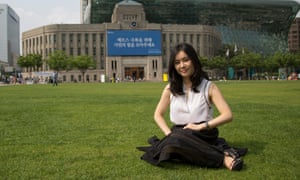Divulging Reality
"It was genuine respect and fear mixed together. They had to show they were loyal to the regime in order to survive."
"I saw people dying on the street. I was shocked. If we went near the train station or under the bridge we can easily see those dead bodies everywhere and the smells of decomposing bodies."
"I believed we were the most privileged human beings -- but they are dying from starvation on the street? It didn't make sense to me at all."
"We were suffering severe power shortages every night but China has brilliant lights at night and even neon signs. I wanted to find out the answer myself by seeing the real life in China with my own eyes and I was very young, naive girl at the time so I was brave. I took the huge risk by crossing the border."
"One thing I could never handle was being separated from my family It was very sad; living in South Korea -- so close but very far away. The farthest place."
Hyeonson Lee, North Korean defector, author, The Girl With Seven Names

Her step-father worked with the military in North Korea and theirs was a privileged life of wanting for little, unlike the situation of the bulk of the population. Until he fell under suspicion and was arrested by military police who suspected him to be involved in illicit business deals and contacts. No longer in the good graces of the government, he was said to have committed suicide while in hospital.
With the collapse and dissolution of the Soviet Union, North Korea fell into penurious economic collapse. The Kim dynasty had to decide whether to use what funding it had to either promote agriculture and feed its people, or strengthen their nuclear program, and produce missiles, and the result was mass starvation. Hyeonseo Lee recalls seeing a man hanged under the railway bridge; she and her family had attended a mandatory public execution.
A public education campaign was launched by the government with the slogan "Let us eat two meals a day", becoming a symbol of virtue in a country where food was in short supply but for that demographic favoured by the government, including families of the military. Food availability and distribution deteriorated and famine stalked the land. What the teen-age Hyeonseo Lee witnessed was profoundly disturbing to her.
This was, after all, the greatest country in the world. Its beloved and internationally respected leader was capable of producing miracles. He was a benevolent father figure who would allow no harm to come to his people. The pedestal he placed himself on with the support of the military and his courtiers attested to his demi-god status. Then came the family move to another city and her exposure to fleeting glimpses of another way of life.
Control was and is absolute in the hermit kingdom of a megalomaniac dynasty. In her home hung portraits of the Kim family. Great Leader Kim Il-sung, his son and heir Dear Leader Kim Jong-il, and in turn his son and heir Kim Jong-un, the current tyrant. The framed photographs were cleaned daily with a special cloth distributed by the government for that purpose and none other. The portraits' protocol was precise.

AFP PHOTO / KCNA VIA KNS This
picture released from North Korea's official Korean Central News Agency
(KCNA) on June 15, 2015 shows North Korean leader Kim Jong-Un.
They must represent the most prominent objects in any room, must be hung higher than any others and perfectly aligned on a wall with no other competitive adornments. Monthly, government officials would visit each home in the neighbourhood to inspect the portraits White-gloved officials would determine whether dust was left on them, or whether they were improperly hung, and those guilty would be punished.
From her new home on the border with China she crossed a frozen river to enter China with the intention of visiting her father's relatives briefly, on the Chinese side, after which she would return. But in fact, she did not go back. She remained in China, illegally, moving about stealthily, working in service jobs, changing her identity. She eventually helped her mother and brother escape North Korea with the aid of a smuggling gang.
Now she lives in South Korea. She was 17 when she left North Korea, and is now 32 years of age. And she has told her story of escape to the outside world. Her purpose is to ensure that the outside world is informed of what life is like in North Korea. And in the hope that her story may filter through to people in the North, to inspire them to the discovery that they have been manipulated to believe they have no option but to live under a tyrannical regime which abridges their most basic human rights.
Labels: Human Relations, North Korea, Political Realities, Social Dysfunction

<< Home